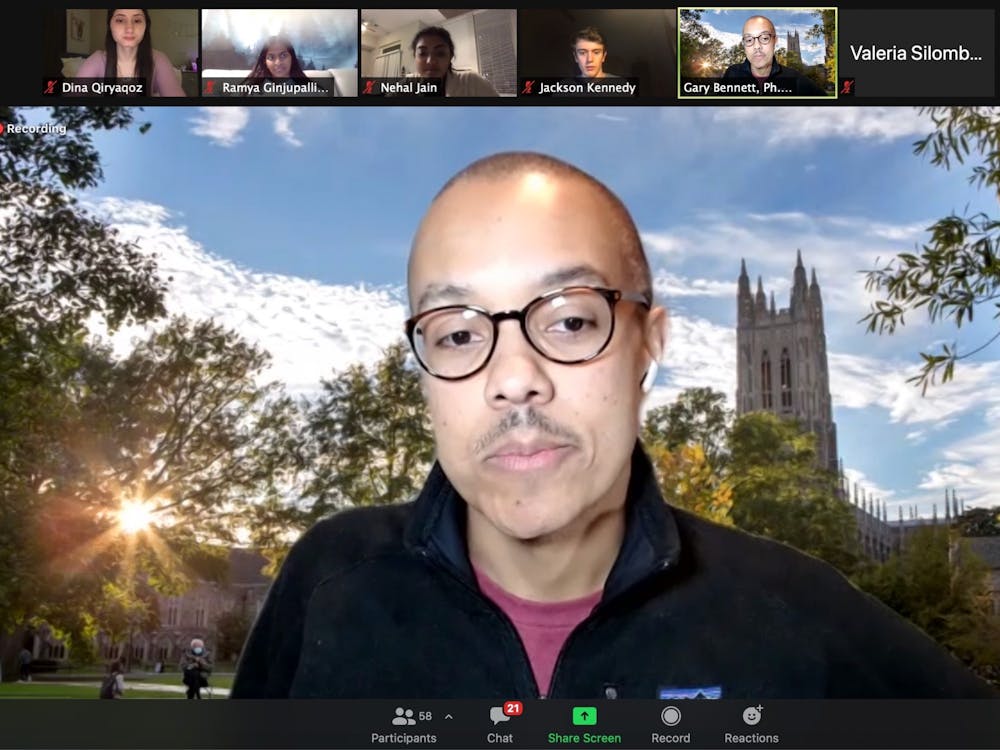Duke administrators discussed the future of Duke's pandemic response at Wednesdays's Duke Student Government Senate meeting.
Senators heard a presentation from Gary Bennett, vice provost for undergraduate education, and Landy Elliot, assistant vice provost for undergraduate strategic initiatives and communications, to discuss how the Duke administration is dealing with an increase in COVID-19 cases around campus.
Bennett praised Duke students for being flexible and resilient in the unprecedented time. He noted that he appreciates the relationship between the Duke administration and DSG.
After the discussion, Bennett took questions from senators. Senator Ramya Ginjupalli, a junior, asked how the Duke administration would handle the situation where the number of positive cases was not going down and whether or not students would have access to necessary information in time.
“It depends on the situation, since this pandemic does not offer an on-off switch solution. We are monitoring the flow of students on campus, and if we have to be more aggressive about the solution, we are considering a variety of solutions, including going completely remote. Right now, we are focusing on how to best protect the students without resorting to the more aggressive means,” Bennett responded.
First-year senator Nicole Rosenzweig followed up on Ginjupalli's question and asked if there is a threshold at which Duke will respond in a certain way. Bennett said there is no specific threshold, but emphasized that the administration is monitoring the situation on campus very closely.
Administrators warned on Tuesday that Duke might have to restrict campus access or go fully online if cases don't go down. The warning came the same day that the number of positive tests the University has reported this semester surpassed that of the entire fall semester.
First-year senator Zoe Tishaev asked about Duke’s encouragement to students to dine outside, since many transmission cases have involved dining. Bennett acknowledged that this problem is not unique to the Duke community, and the administration has been strongly advising people to dine outside to lower the risk of being exposed.
At the same time, he noted that many students are avoiding outside dining due to the cold weather, and the Duke administration is examining a variety of alternatives. Bennett referred questions related to dining to Mary Pat McMahon, vice provost and vice president for student affairs, since he is not directly involved with dining.
Stephanie Green, a junior and DSG senator, asked about the administration’s perspective on the Duke undergraduate curriculum and future courses. Bennett responded that one unique thing about Duke education is the focusing on smaller classes for students to open up dialogue.
Even confronted by the pandemic, Duke faculty members are still working on designing a university course that could reflect the diverse community on campus. Bennett emphasized the need for more student inputs in creating future courses.
Senator Hana Hendi, a sophomore, asked whether the Duke administration would work to offer more online opportunities for students even after the pandemic. Bennett acknowledged that the pandemic has fundamentally changed how Duke students interact with each other. However, he agreed that the restructuring of classes helps many students to be more academically engaged than they would have been.
Sophomore senator Dawei Gao asked Bennett about specific Duke policies regarding low-income, first-generation students. Bennett stated that Duke has been committed to creating an inclusive space for all students and helping students get accessed to necessary technology.
In other business
The Senate discussed election rules and procedures changes. DSG Attorney General Jason Scharff, a senior, has been collecting suggestions and feedback to create more open and inclusive election rules. These changes include policies regarding the process of endorsement, with inputs from President Pro Tempore Valeria Silombria, a senior.
Lastly, the Senate examined revised election by-laws. With the help of Executive Vice President Dina Qiryaqoz, a junior, these procedures have been clarified and made more comprehensible.
DSG also reviewed and confirmed newly added amendments during the meeting. The amendments concern the establishment of the Student Advocate’s Office, which provides support for students during institutional processes with the Duke administration about student conduct.
Get The Chronicle straight to your inbox
Sign up for our weekly newsletter. Cancel at any time.
Tri Truong is a Trinity junior and an associate news editor of The Chronicle's 117th volume.

